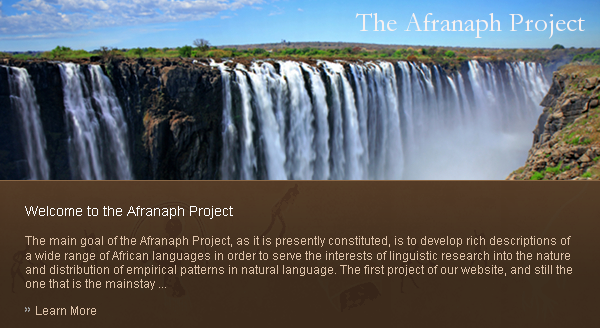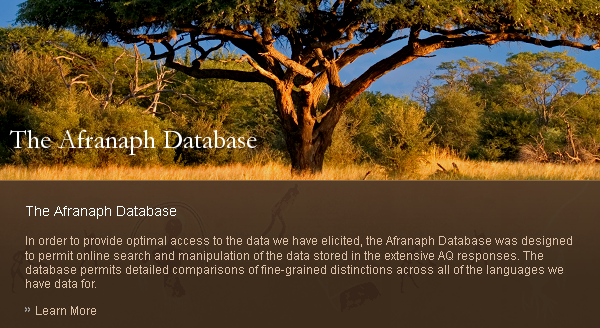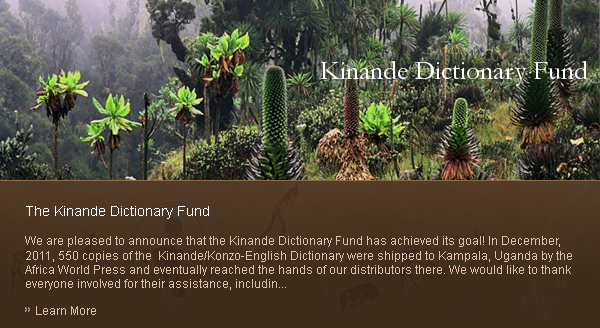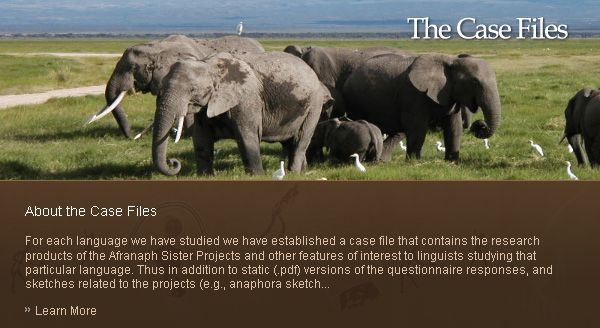- Last Updated on Wednesday, 05 February 2020 10:47
December 10-11 (tentative), 2010 - Rutgers University, New Brunswick
!!!! - Revised Deadline - June 16, 2010. New Information about funded travel included - !!!!
Call for Papers
The Afranaph Project, which was originally designed to explore empirical patterns of anaphoric phenomena in the languages of Africa, is expanding its empirical scope, using the infrastructure developed in the last six years, to initiate explorations in other domains of grammar in the languages of Africa and perhaps beyond. The purpose of this workshop is to encourage the development of research that exploits our data and our database, to consider proposals for new domains of research that suit our methodology and resources, and to bring together those who have worked on the project or the languages that are studied in it and to consider how the project can be developed over the next several years as a platform for research into new empirical domains.
We envision a workshop conference involving linguistic theorists, linguists specializing in comparative African linguistics, and native speaker language consultants already working with our project (with the understanding that these are usually overlapping categories). Three sorts of conference presentations are appropriate to our goals.
A. Proposals for new research topics (NRT) to be developed in collaboration with Afranaph. See the guidelines and
opportunities for NRT proposals below.
B. Papers on any linguistic topic that in some way exploits our existing Afranaph resources.
C. Papers that explore topics that include the analysis of languages that are currently explored in posted Afranaph
resources.
Most of the NRT papers will ultimately be invited based on pre-conference interactions as described below, but we stress that we are prepared to consider NRT presentations from researchers we currently do not know if they initiate conversations with us about the projects they would like to develop. Papers that fall into the other two categories will be accepted based on the result of competitive abstract evaluation (though it does not hurt to contact us before submitting to test the waters). Approximately 8-10 papers will be selected for presentation at the workshop in addition to the 6-8 NRT papers. The NRT presenters will be 45 minutes long with 15 minutes for questions and the other talks will be 30 minutes long with 10 minutes for questions.
For those whose abstracts are accepted, we have funds to pay for airfare from Africa and accommodations for visitors from Africa and we have at least enough for airfare from those traveling from North America or Europe, perhaps also for accommodations depending on who turns out to be attending. We do not expect to fund more than one presenter per abstract, but we will consider special cases depending on our budget.
The Submission Deadline for all abstracts, including NRT abstracts, is revised to June 16 and decisions will be made no later than July 15. The early deadline is designed to provide time for those who may need lead time to acquire visas. Money is available to support travel and lodging for most conference participants, but the amounts available may or may not be enough to fully cover travel and lodging, depending on how many selected participants are traveling from a considerable distance.
Abstracts should not exceed two pages including examples and references and must be in 10pt type or larger. Please submit your abstract electronically to This email address is being protected from spambots. You need JavaScript enabled to view it. or mail your abstract so it arrives by May 24, 2010 to Department of Linguistics, Rutgers University, 18 Seminary Place, New Brunswick, NJ 08901-1184.
Our present plan is for the APDW-1 Proceedings to be electronically published on the Afranaph site, but alternative plans for publication will also be discussed at the workshop.
More on NRT abstracts
NRT presentations should be research proposals that draw attention to empirical domains relevant to active questions in linguistic investigation and the topic should be a good match for our elicitation methodology, our network of NSLCs, and our dissemination infrastructure (i.e., the website and the database). In the latter regard, NRT proposals must show thoughtful familiarity with the Afranaph site and database. Those interested in submitting a proposal of this kind must contact us well in advance for assistance in formulating their proposal (including help exploring our resources and their limits. We will consider between 6-8 proposals of this kind for presentation at the conference.
After the workshop, two or three NRT proposals will be selected for further development of pilot projects to be supported by Afranaph. Presenters of the selected proposals will be invited back for a small workshop in Spring, 2011 to sharpen the new research goals, to develop elicitation materials, to consider issues of database design relevant to the new research, and to participate in trial elicitations, all with an eye toward helping participants develop their own larger proposals for new outside funding.
P.S. Please take a look at our site (www.africananaphora.rutgers.edu) for application information about postdoctoral positions with the Afranaph project available for 2011-2012






